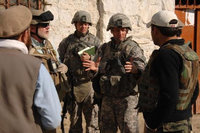Of foreign policy's dirtiest words, which do Americans least like to hear: war or state-building? That is the question the Obama administration now has to ask itself about Afpakia, the most volatile swath of South Asia. Afghanistan, the world's largest opium producer, is a failed state. Pakistan, chronically unstable, possesses dozens of nuclear weapons. India, the regional power, would typically stabilize all of this, but it has been at war with Pakistan, on and off, for the last six decades. As the new administration in Washington contemplates an Afpakia strategy, at first glance nearly everyone seems to agree on the way forward. Richard Holbrooke, the newly appointed special envoy to the region, said last week, "Victory as defined in purely military terms is not achievable, and I cannot stress that too highly." Likewise, Lt. Gen. David McKiernan, the commander of U.S. and NATO forces in Afghanistan, said Wednesday, "I've always said that this will not be a military outcome; this will eventually be a political outcome." President Barack Obama himself said, "I am absolutely convinced that you cannot solve the problem of Afghanistan -- the Taliban, the spread of extremism in that region -- solely by military means." Yet, on Tuesday the president ordered 17,000 more troops to Afghanistan.
Under the Influence: Building Afpakia at the Point of a Gun

